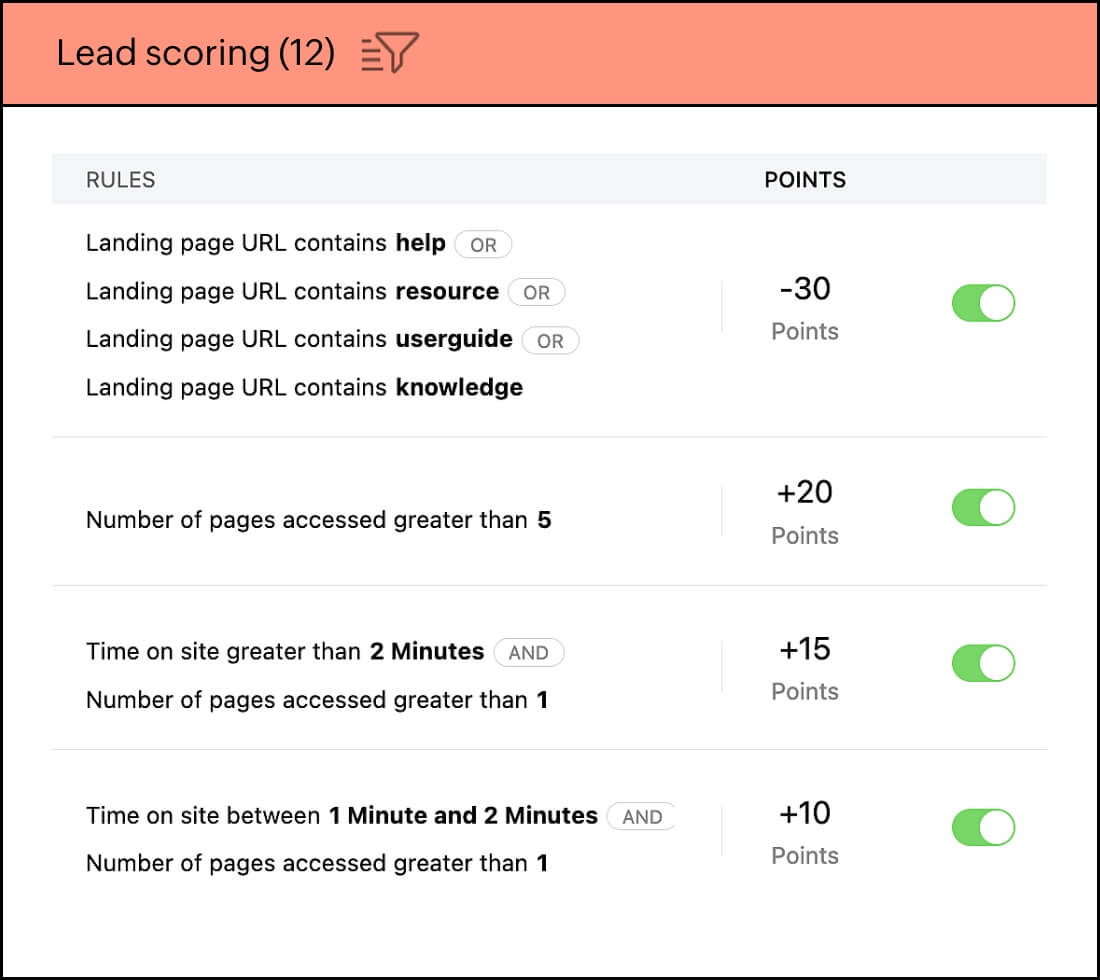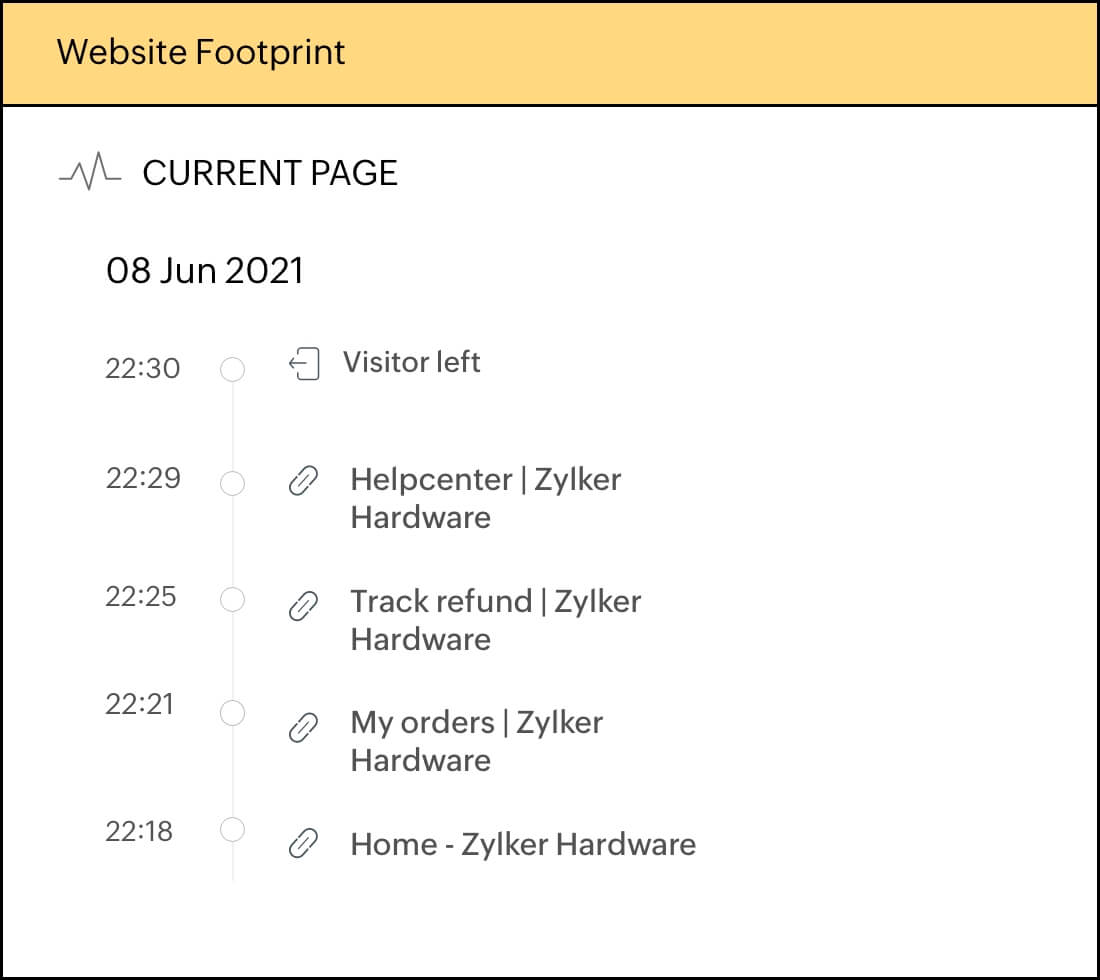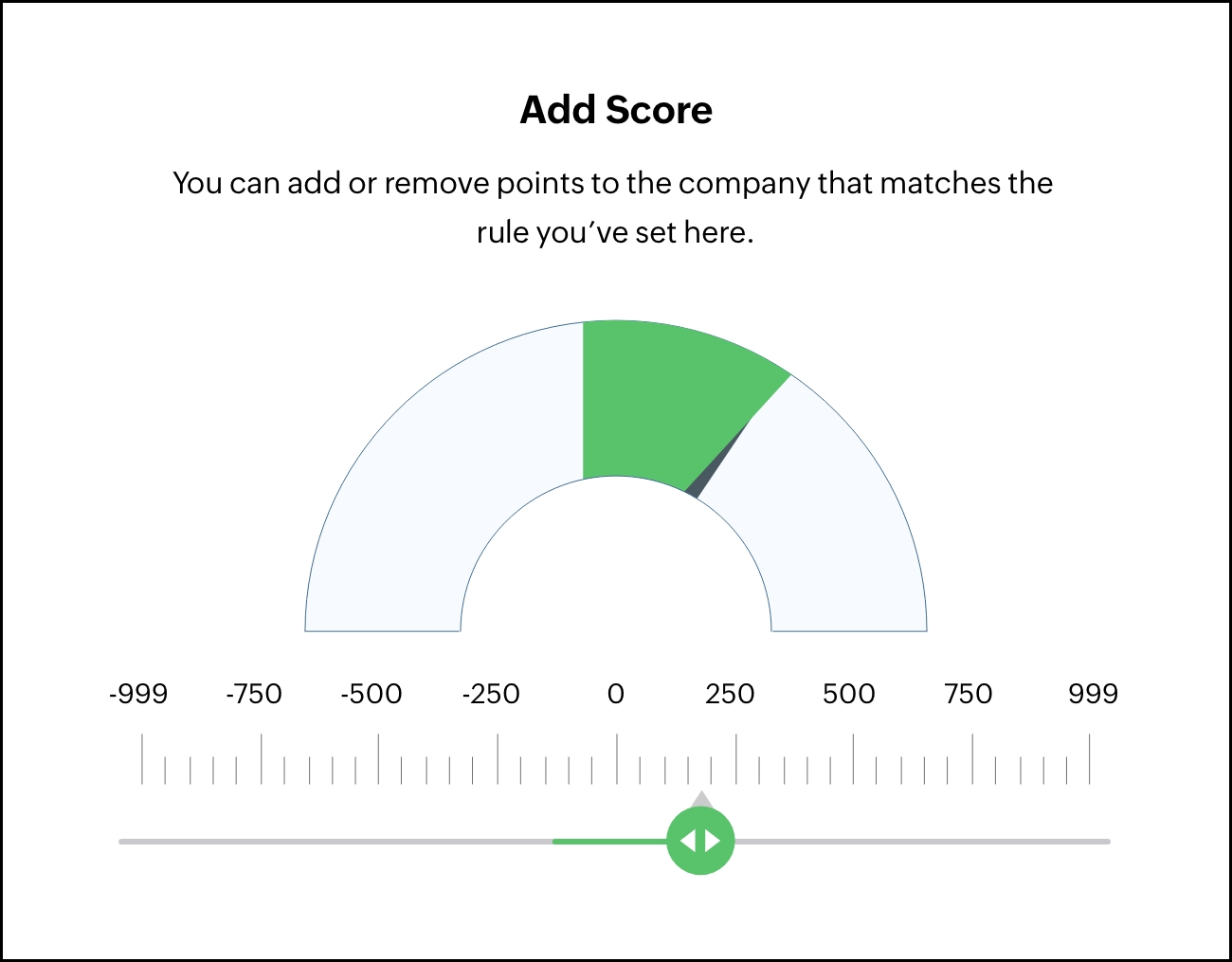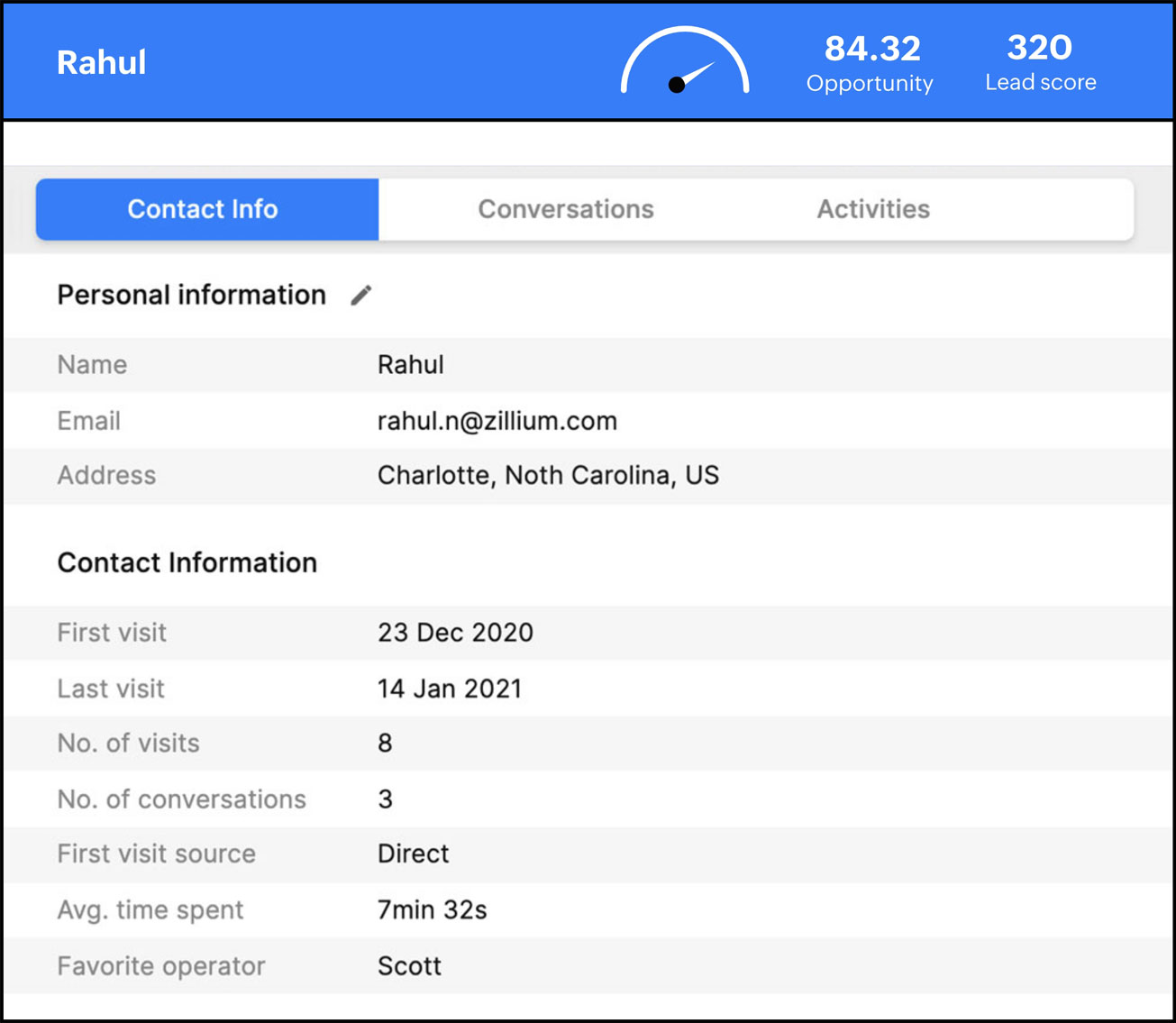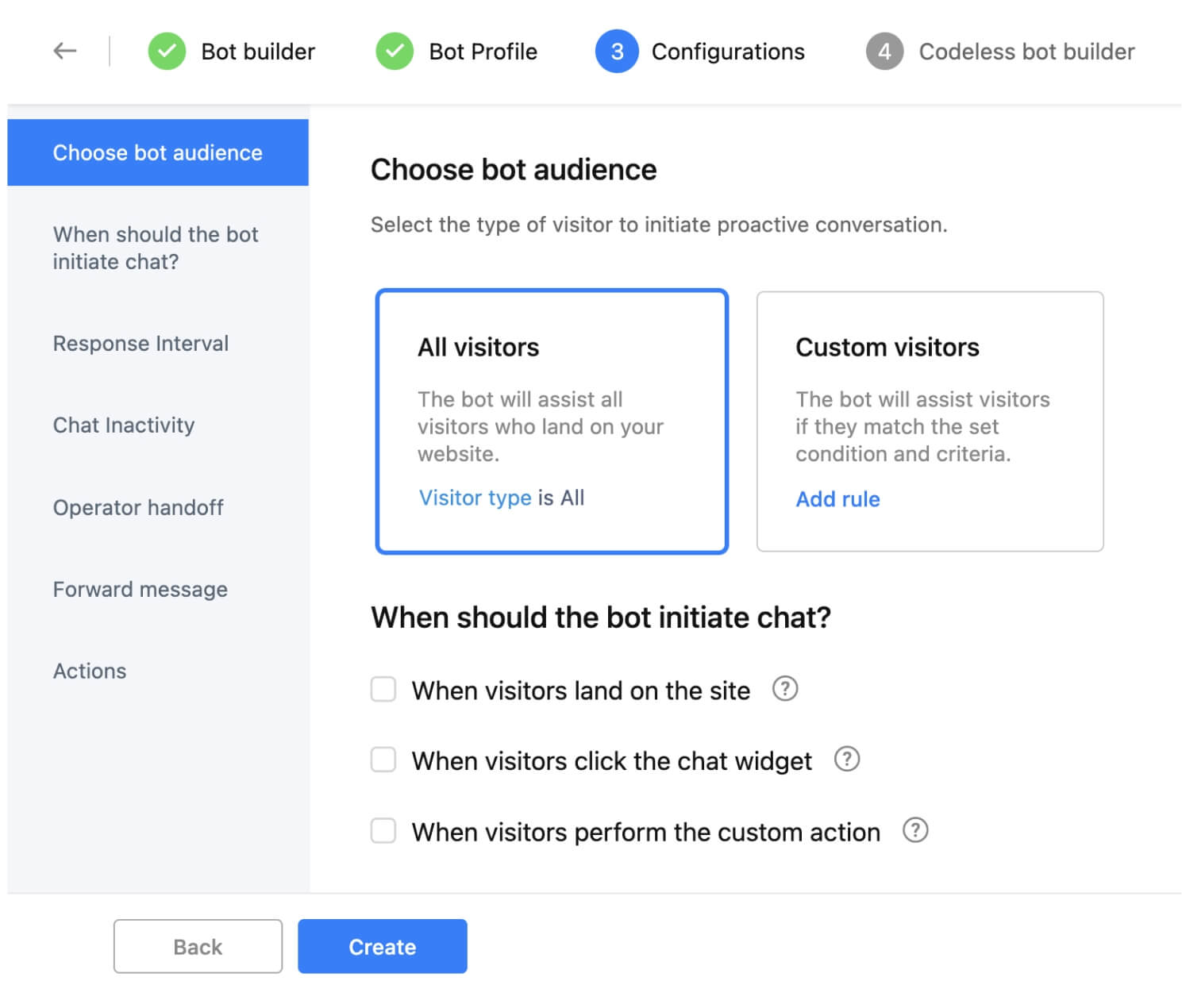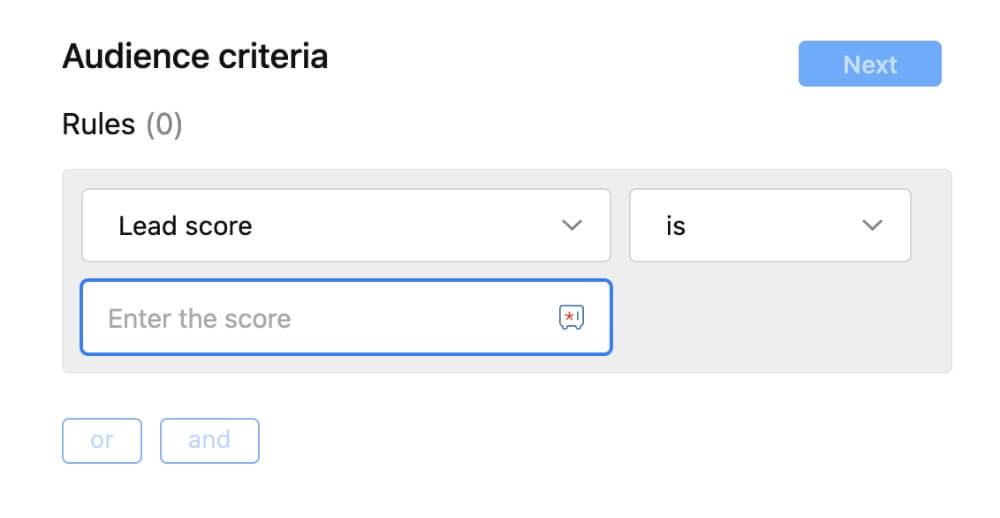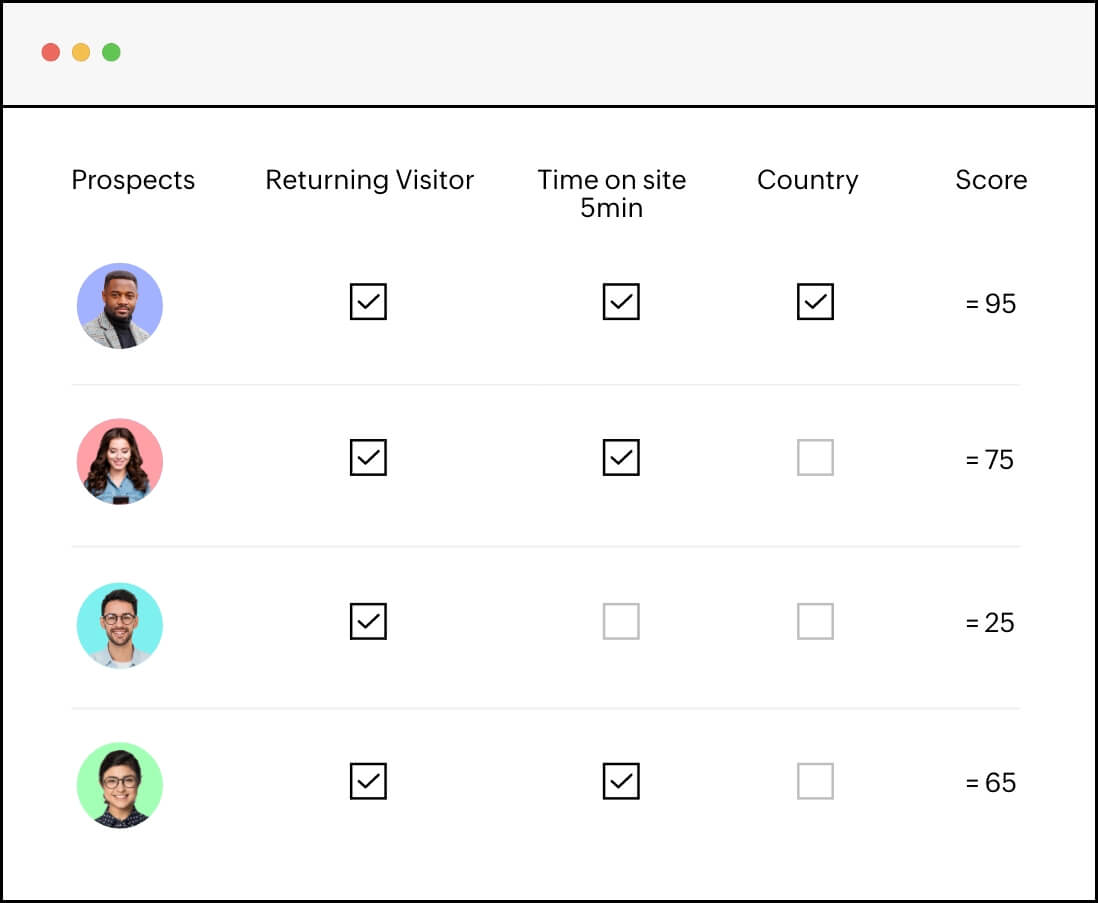What is lead scoring and what is the difference between lead scoring and contact scoring?
Lead scoring is the process of adding points/scores to leads based on their demographics and behavior on your site to rank them based on their likelihood of buying your products/services. Lead scoring improves the efficiency of your sales and marketing teams by helping them concentrate on leads that have the highest potential to become customers. This in turn helps your business save time and resources, increase productivity, and guarantee ROI.
Lead scoring pertains to unknown leads visiting your website. If the same lead has provided details such as name, email address/ID, or company, these leads are known as contacts, and contact scoring helps identify the most engaged contacts to take a targeted approach for your follow-up and nurturing strategy.
What are the different types of lead scoring and what are their uses?
In general, there are two types of lead scoring—implicit lead scoring and explicit lead scoring.
Implicit lead scoring focuses on website visitors' behavior like downloading a brochure, adding an item to a cart, registering for a demo, etc. It uses negative scoring to disqualify people whose activity on your site mimics that of an ideal prospect but do not fit your ICP, like job aspirants or competitors looking for information on your site. Focusing only on positive lead scoring here might result in score inflation and add irrelevant website visitors to your hot/warm leads segment.
On the other hand, explicit scoring assigns points to a lead based on specific metrics, such as demographic details, company size, region, etc.
What is lead scoring software and what types of businesses use it?
Lead scoring software is a tool that rates leads based on key attributes of your choice like traffic source, location, number of pages accessed, number of visits, time spent, interactions they've had with your business, and more. Companies can develop thresholds and standards to rank prospects using lead scoring software.
Though lead scoring software is helpful for companies of all types and sizes, it's critical for businesses that have limited financial and human resources like startups and SMBs. Both B2B or B2C businesses need lead scoring software to determine which leads to focus on to achieve the highest ROI on their sales and marketing efforts.
What is the difference between lead scoring software and lead management software?
Lead scoring software and lead management software are both tools used in the process of managing and prioritizing leads, but they serve different purposes. Lead scoring software focuses specifically on evaluating lead quality, while lead management software encompasses a broader set of tools and functionalities to manage leads comprehensively throughout their lifecycle.
Lead scoring software grades leads based on their demographic information, behavior on your website, and interaction with your business. It helps you gauge the level of interest and the potential value of a lead so you can work with the ones that are most likely to give you a sale.
Lead management software, on the other hand streamlines all aspects of the sales cycle—like lead capture, data collection, tracking and organizing leads, and facilitating communication between sales and marketing—and helps businesses manage their sales workflows. The primary goal of lead management software is to ensure that leads are efficiently managed from the moment they're generated until they become customers or move further in the sales pipeline.
Why do marketers need lead scoring software? Can lead scores be added to CRM?
Lead scoring software removes the guesswork from marketing by providing a clear system for identifying Marketing Qualified Leads (MQLs). With an effective lead scoring system, marketers can allocate resources more efficiently to nurture high-potential leads. These tools help optimize the marketing database and enable targeted, personalized campaigns based on leads' engagement levels and purchase intent. Additionally, lead scoring helps identify and eliminate ineffective marketing efforts, allowing resources to be redirected towards campaigns that deliver better ROI.
Generally, lead scores acquired by each visitor can be pushed from your lead scoring tool to your CRM software. By syncing lead scores with your CRM, sales and marketing teams can make data-driven decisions and take actionable steps to advance leads through the sales cycle more effectively.
What are the different types of lead scoring platforms?
There are different kinds of lead scoring tools available on the market today, each with their own pros and cons. Here are the most common ones:
- Rule-based lead scoring software: This type of lead scoring tool rates leads using predefined rules based on personal information, behavior, and level of engagement. Ideal for businesses seeking a simple yet effective lead scoring solution.
- Predictive lead scoring software: A predictive lead scoring tool uses machine learning and predictive analytics to analyze historical data and identify patterns that correlate with conversion based on which leads are scored. Best suited for businesses that get a large volume of leads, have sufficient historical data, and are looking for a more sophisticated lead scoring system.
- Fit-based lead scoring software: This B2B lead scoring software evaluates the fit or alignment of a lead with your ICP. It assigns scores based on factors like company size, industry, job title, location, and other firmographic and demographic data.
- Composite lead scoring software: Composite lead scoring software combines different scoring models or algorithms to generate a composite score.
- Account-based lead scoring software: This lead scoring platform enables businesses to prioritize leads based on their potential value within specific target accounts. Unlike traditional lead scoring solutions which assess individual leads, an account-based lead scoring system considers the characteristics and behavior of the entire company or account. This works for organizations that do with account-based marketing (ABM) and focus their efforts on specific high-value accounts.
What are the key features of lead scoring tools?
- Customizable scoring rules: Lead scoring tools should allow users to create and customize scoring models based on relevant criteria. They should also include negative scoring to remove irrelevant visitors like competitors or job aspirants.
- Data integration: The software should integrate with various data sources like CRM tools, marketing automation platforms, and website analytics tools to gather relevant data about leads. This ensures that the scoring is based on updated information.
- Real-time scoring and monitoring: A lead scoring platform should provide real-time scoring capabilities, updating lead scores as new data becomes available or as lead behavior changes.
- Lead prioritization and routing: The lead scoring software should allow lead prioritization based on their scores, ensuring that sales teams focus on the right leads. It should also route leads to the right sales representatives based on a predefined criteria.
- Integration with sales and marketing tools: A lead scoring tool should also integrate with other sales and marketing tools like CRM, marketing automation platforms, email marketing tools, and customer support systems to facilitate automated workflows for follow-up actions based on lead scores.
What are the benefits of lead scoring software?
Here are some of the key benefits of lead scoring software :
- Efficient lead prioritization: Lead scoring tools help businesses prioritize and focus their resources on high-quality leads that are most likely to convert.
- Sales and marketing alignment: Lead scoring software promotes better alignment between sales and marketing and provides a common framework for evaluating leads, allowing both teams to have a shared understanding of lead quality. This enhances collaboration, leading to effective lead management and higher conversion.
- Enhanced lead nurturing: Lead scoring solutions help deliver targeted content to leads throughout their buyer's journey. This personalized approach increases engagement, builds trust, and leads to shorter sales cycles.
- Efficient resource allocation: Lead scoring software provides valuable insights into lead behavior and engagement patterns. This helps to cut marketing efforts that generate poor leads and allocate resources to campaigns that give a higher ROI.
- Higher conversion rate: By accurately assessing lead quality, lead scoring software enables businesses to prioritize quality leads and optimize their sales and marketing efforts, resulting in an increased conversion rate.
Why choose Zoho SalesIQ's lead scoring platform?
Here are some compelling reasons to choose Zoho SalesIQ's lead scoring software for your business:
- Behavior tracking: Tracks and records lead behavior like page navigation, time spent, and chat interactions. This provides valuable insights into their preferences and intent using which you can deliver personalized experiences and messaging.
- Real-time lead scoring: Evaluates leads in real time, giving you up-to-date insights. As leads engage with your website, the lead scoring software analyzes their behavior and updates the scores, enabling you to engage with them at the right time.
- Customizable lead scoring model: Allows you to define and customize the rules used for scoring leads to match your ICP. You can set up scoring rules based on factors like website visits, page views, time spent, chat interactions, and more.
- Integration with Zoho CRM: Integrates with Zoho CRM ensuring smooth data flow between the two systems, allowing you to leverage our lead scoring capabilities within the context of CRM for a comprehensive view of your leads' behavior.
- Workflow automation: Allows you to automate workflows to be executed when a lead reaches a certain score threshold.
- Reporting and analytics: SalesIQ's lead scoring software provides detailed analytics and reports to help you monitor and measure the effectiveness of your marketing and sales efforts, enabling data-driven decision-making and continuous improvement.
